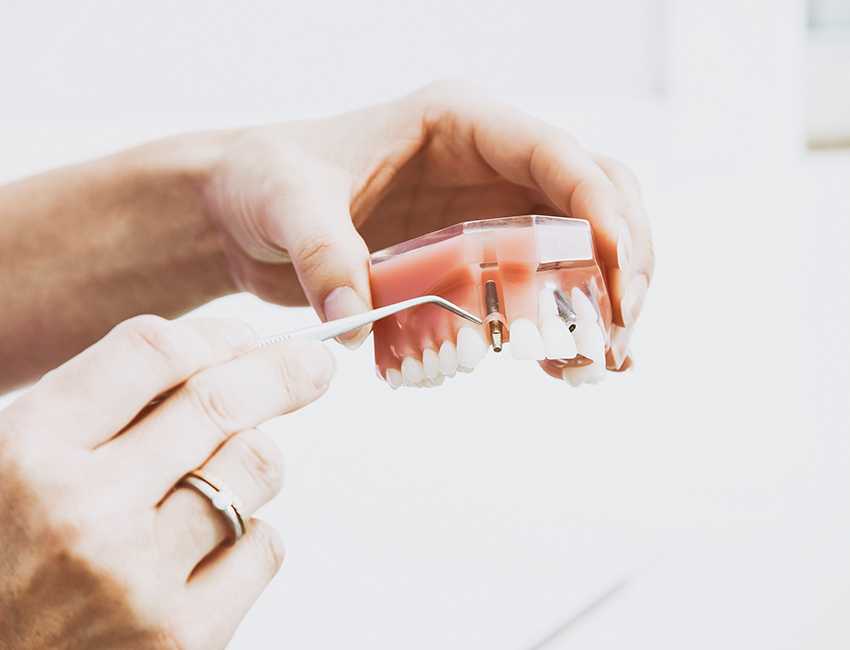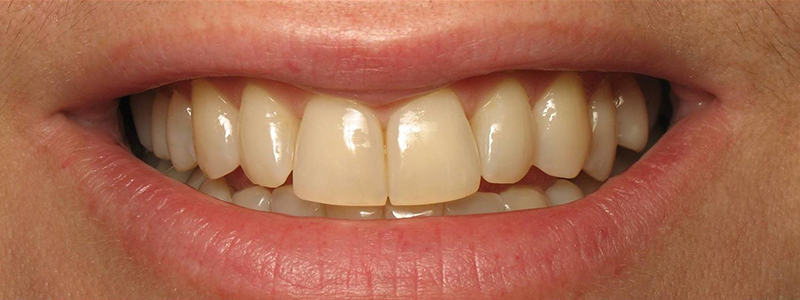DENTAL IMPLANTS

We Humans lose teeth constantly, either through injury (when teeth are taken out) or because of rotten teeth or gum diseases or advanced age. No matter what are the reasons for losing your teeth, they should be replaced, both for aesthetic and functional reasons.
Implants are the cutting edge method for replacing missing teeth. Dental Implants are a wonder in tooth replacement using innovation, utilizing an extraordinary framework that secures a new, normal looking tooth in the open space from your missing tooth. Dental Implants are utilized as a substitution to normal teeth that have been lost or need to be extracted to assist with reestablishing the patient’s regular dentition. They are basically a titanium supplement of ‘fake tooth root’ which sits into the jawbone giving a foundation to crowns, bridges dentures to be put similar as a characteristic tooth.
Multiple implants can likewise be utilized to replace multiple teeth.
This makes dental implants an extremely adaptable tooth-substitution choice.
Regardless of whether you are missing one tooth, a few teeth or every one of your teeth, dental implants are preferred by dental specialists and patients alike.
1. What is the cost of Dental Implants?
The average cost for a dental implant treatment which includes the implant, abutment and crown is approximately X.
starting from 1 lakh, but can vary depending upon the complexity of the case2. Do you think any other tooth-replacement option like a denture, is better than a dental implant?
Dental implants are convenient and economical compared to other tooth replacement options, especially when you take into account long-term cost-effectiveness and enhancing the quality of life. Please note that the dental implant treatments are customized for your specific needs, hence the costs vary for every patient.
3. Is dental implant treatment painful?
We are equipped with advance technology and our trained medical professionals ensure the best possible treatment and experience.
As a process, local anaesthesia is administered to reduce the pain. As a result, the defined area in the mouth becomes numb making sure that you don’t experience pain throughout your treatment except for pressure or vibration.
During complex surgeries involving multiple implants, patients may be sedated to ensure they are comfortable and relaxed. Post the surgery, patients are usually advised to consume soft foods for some days as the gum may feel a little sore.
4. Once my tooth is removed, will there be a gap?
There will be a temporary gap as the gum should heal after tooth removal and before an implant can be placed to avoid any sort of infection. However, as mentioned, every case is unique. In some cases, we may recommend immediate implants based on the patient’s medical history.
If there is a gap period, we provide temporary solutions, both fixed and removable, to make sure there is no embarrassment at any stage through the implant process.
5. What is the total duration of the treatment?
Please note that the dental implant treatments are customized for your specific needs, hence the duration may vary for every patient.
Overall, the treatment duration ranges between 8-10 weeks which includes placement of the implant to the final fit of the crown. However, sometimes the treatment may take longer depending on the level of complexity of the case, thus extending up to a year.
6. Is there a probability that the dental implant may fail?
Surgical procedures can have complications and dental implants are no exception. However, we update the patient about possible outcomes at the assessment stage, so that one can make an informed decision.
7. Is there a warranty in case the dental implant fails?
Please note that when an implant is placed, your bone needs to grow and fuse with the implant. This process is known as Osseointegration.
In the unlikely event that your bone fails to grow onto an implant, we offer the choice of either a?8. It's been a long time since my teeth have been missing. Will this impact my dental implant treatment?
Yes, it does have an impact on your dental implant treatment. However, with advanced technology, it is not a worry.
At Studio Dentale, we begin with a comprehensive implant assessment of the mouth and jaw bone which includes, study models, photographs, and a 3D CT Scan. Our experienced dental laboratories evaluate and provide a long-term solution for our patients. If a dental implant is not possible based on the patient’s history, we provide alternate dental options.9. Can you replace all my teeth with dental implants?
All your teeth can be replaced with dental implants.
Instead of one implant per tooth, we can provide a maximum of four to eight implants to replace all of the upper or/and lower teeth.10. Can implants replace dentures?
Yes, implants are sophisticated, convenient and long-lasting. On the other hand, dentures may turn out to be a patients’ nightmare due to difficulty in wearing and following everyday routine. To ensure a confident and lasting smile, we recommend dental implants.
11. Can you put my dental implant at the time when my tooth is being removed?
Yes, in some cases, our skilled Doctors can place an implant immediately after extraction in the socket, provided there is no infection. However, most of the time, it is better to wait for complete healing before placing dental implants to avoid discomfort to the patient.
12. How long do dental implants last?
Dental implants are long term integration and with the right care and maintenance, an implant should last you a lifetime.
As in the case of natural teeth, a dental implant may chip or become loose however that can be easily corrected. Annual reviews with x-rays to check the bone levels around the implants in addition to your regular check-ups is suggested with your dentist.
13. Can I go for dental implants if I am a regular smoker?
Smoking affects both natural teeth and implants. It increases the risks of gum disease and may lead to complications at every stage of implant treatment.
We totally recommend a “no smoking” policy to reduce any chances of implant failure in the long run. Having said that, we have been successfully treating patients who are regular smokers.
14. What is the right age to go for dental implant treatment?
Dental implants are suitable for any age except individuals below the age of 18 years as the jaw is still developing along with the bone tissue.
15. In what scenario are dental implants avoided/rejected?
Usually, dental implants may not be recommended for patients that have specific medical conditions. For example, if an individual has previously undergone radiotherapy of the jaw or their diabetes is not under control.
16. Do I need a bone graft before the dental implant procedure?
Since dental implants are directly inserted into the jaw, the Doctor needs to make sure that there is a required bone to support the implant. In the absence, it is advisable to graft a bone from other body parts, commonly the shin or hip, and insert it into the jaw. A bone graft may be performed under local anaesthetic, or in the hospital under the supervision of a general anaesthetic.
POST OPERATIVE INSTRUCTIONS FOLLOWING AN IMPLANT PROCEDURE
Dental implants have excellent success rate, however an implant in some cases might fail to fuse correctly. Things like smoking and neglecting to keep up with appropriate oral cleanliness can bring about issues with the implant and possible complications. Tragically, in that situation, the implant should be removed, the bone cleaned, and the method rehashed (whenever wanted) in a couple of months. There are a couple of things you can do to guarantee that the implants are effective, for example,
* Daily Oral hygiene
Brushing and flossing every day is significant, and brings down the likelihood of complexities. Keeping the gum tissue clear of particulates is important to ensure the implant site isn’t infected. An oscillating brush is useful to get between the teeth, gums, and the implant itself.
* Regular Dental visits.
It is imperative to ensure you have dental check-ups to guarantee that the implants are working appropriately and that your gums are sound and healthy.
* Try not to bite hard articles that can break the implant tooth and its crown. Also, avoid tobacco items, as they can expand the danger of a periodontal infection. If you suffer from teeth grinding habits, alert your dental specialist to seek treatment.
Dental implants can assist with working to your satisfaction and alter the quality of your life. Be sure to properly explore oral specialists and set yourself up for a long strategy and healing period
Everyone realizes the importance of something once it is lost.
This young patient met with an unfortunate accident and lost one of his front teeth.
He had never even imagined that he would have to live with a missing front tooth at such a young age. He was really conscious of his smile when he entered Studio Dentale.
The best treatment solution for replacing the missing tooth was to place a Dental implant.
Dental implants are permanent fixed solution for missing tooth or teeth. We were able to restore his missing smile with a dental implant.
He was relieved that he didn’t need to live with a missing front. tooth anymore.
- It starts at NPR 1, 20,000/- per tooth
- Dental implant crown : Ranges from NPR 27000 to NPR 50000
- Implant hybrid prosthesis : Ranges from NPR 12000 to NPR 20000

WHAT TO EXPECT?
Prior to the procedure, you’ll see your dental specialist for an underlying discussion. Your dental specialist will give you a complete assessment. They’ll take X-rays and discuss with you the choices to plan for the implant surgery. Once you have a plan and they’ve set up that you’re healthy, they’ll plan the medical procedure arrangement.
The next appointment may involve eliminating a potentially damaged tooth, in case that was the reason for the dental implant procedure. Furthermore, a bone graft might be fundamental assuming your jawbone isn’t prepared to support the method. Anticipate that the entire procedure should require a while, including healing time between the insertion of the implant, the abutment, and then the tooth and crown.
In the main stage,the surgical placement of the implant, your mouth will be completely desensitized with local sedation so you don’t feel any pain or uneasiness.A cut is made in your gums to put the tooth root implant into the jawbone in the area of your missing tooth. When the implant is set, the dental specialist shuts the gums over the implant so it stays covered.
You’ll recover at home and will likely return for the second phase of the treatment in a couple of months. That gives sufficient time for the bone to grow around the implant, making it strong enough to stay in place. This cycle is called osseointegration, which means the titanium consolidates with the bone.
Every patient heals differently, so it can require as long as a half year before the substitution teeth can be inserted and placed .Now and again, if conditions are favourable,a patient can have everything placed in one appointment.
When the dental specialist discovers that the implant is secure, a connecting piece called an abutment is placed over the post portion of the implant. This is the part that will hold the new tooth.At the point when your gums heal, the dental specialist will make impressions of your teeth and make a custom substitution tooth, additionally called a crown. The crown is then attached to the abutment.
BOOK AN APPOINTMENT






